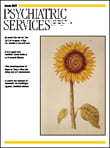Letter
Language and Stigma
To the Editor: Language is an important consideration in trying to beat the stigma of mental illness. It is, therefore, with dismay that I read Koekkoek and colleagues' paper ( 1 ) "'Difficult Patients' in Mental Health Care: A Review" in the June issue. How might the term "difficult patient" be stigmatizing? It frames a person's experience in the pejorative. It implies that people with mental illness are responsible for the symptoms and disabilities that they face. It is patriarchal and suggests that the service provider, not the person, knows what is best. It chastises the person with mental illness for having a poor relationship with the health care provider. True, some of the relationships between consumer and provider may be difficult. But the difficulty lies between the two parties and should not be blamed solely on the person with mental illness. Research has shown that resolution of difficult relationships requires equal interactions by all parties.
What services does this term provide for various mental health stakeholders? After reviewing more than 90 papers, the authors admit that there is little empirical data that lead to meaningful conclusions. "Difficult patient" does not suggest directions for treatment. The theoretical explanations are all over the place: models of chronicity, dependency, counter transference, and sociological factors. The review conflates "difficult" with "diseased." In short, the term "difficult patient" is stigmatizing and adds little to nosological, etiological, or treatment research. If researchers are to continue a prominent role in the antistigma agenda, we need to be critical in our use of language.
1. Koekkoek B, van Meijel B, Hutschemaekers G: "Difficult patients" in mental health care: a review. Psychiatric Services 57:795-802, 2006Google Scholar



